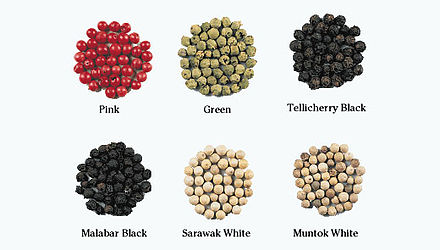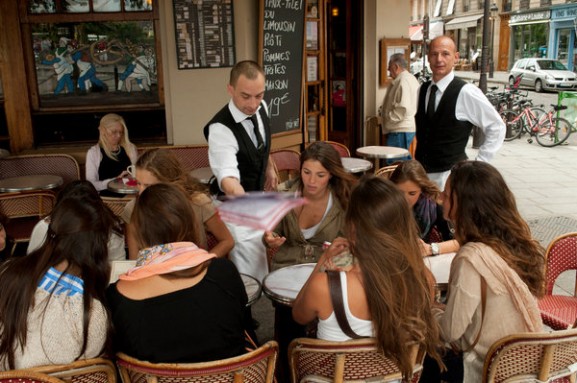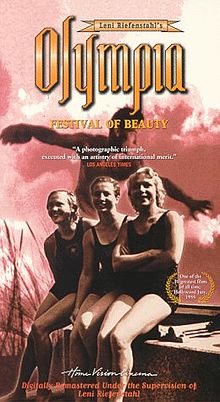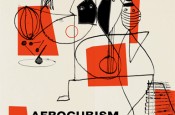When I first lived in Paris, waaaaay back in 1970, a Stanford chum of my father who lived in the toney île st. Louis area of the 5th arrondissement, took me out to dinner at a very nice area restaurant. I was going to the Sorbonne, living in the Latin Quarter, and didn’t have much money. I ate couscous and gros sandwiches tunisiens at North African restaurants: lots of food for not much money. So this night was very special.
We ate a three-star meal, washing it down with lovely bordeaux. When we finished, I politely asked the waiter for a doggie bag. “Garçon, est-ce que vous pouvez me donner un petit sac pour le chien”. He stiffened and frowned, saying “ça ne se fait pas ici, monsieur” (“that isn’t done here”). And so I had to leave the leftovers at the restaurant, probably so one of the employees could take it home to his or her dog. A pity, because it was wintertime and you could just put the leftovers on the balcony and they would keep just fine for the next day.
The thinking was that you were supposed to enjoy a nice meal out in situ, not try to repeat it at home. French vs. American thinking at work.
And so I read with interest this article the other day. The debate goes on, 40+ years later. Mon dieu.
http://www.nytimes.com/times-insider/2014/11/18/french-doggie-bags-the-backstory/?action=click&pgtype=Homepage&module=c-column-top-span-region®ion=c-column-top-span-region&WT.nav=c-column-top-span-region&_r=0


I remember in the BBC special The Life of Birds with the wonderful David Attenborough when crows would drop walnuts from power wires over a crosswalk, then wait for cars to run over them and break the shells, then descend to the street and hop with pedestrians across to grab the shelled nuts. Smart birds.
Check out this clip from the BBC show and be impressed:
https://www.youtube.com/watch?v=BGPGknpq3e0
There was a piece on crow intelligence in yesterday’s New York Times Science section titled Moral: Aesop Knew His Crows.
http://www.nytimes.com/2014/04/10/science/the-moral-aesop-knew-something-about-crows.html?action=click&module=Search®ion=searchResults&mabReward=csesort%3Aw&url=http%3A%2F%2Fquery.nytimes.com%2Fsearch%2Fsitesearch%2F%3Faction%3Dclick%26region%3DMasthead%26pgtype%3DHomepage%26module%3DSearchSubmit%26contentCollection%3DHomepage%26t%3Dqry402%23%2Fcrows&_r=0
If I couldn’t drink the water (like if I didn’t have opposable thumbs) I don’t know if I’d have thought of the pebble solution. But the crow did. Smart bird. Here is the Aesop Fable about the crow and the pitcher. By the way, my last name means “beak” in German so I can relate to this fable. Why somebody way back when would adopt the name “schnabel” is beyond me.
A Crow, half-dead with thirst, came upon a Pitcher which had once been full of water; but when the Crow put its beak into the mouth of the Pitcher he found that only very little water was left in it, and that he could not reach far enough down to get at it. He tried, and he tried, but at last had to give up in despair. Then a thought came to him, and he took a pebble and dropped it into the Pitcher. Then he took another pebble and dropped it into the Pitcher. Then he took another pebble and dropped that into the Pitcher. Then he took another pebble and dropped that into
the Pitcher. Then he took another pebble and dropped that into the Pitcher. Then he took another pebble and dropped that into the Pitcher. At last, at last, he saw the water mount up near him, and after casting in a few more pebbles he was able to quench his thirst and save his life.





Last night, as I ground black pepper and sprinkled some French sea salt into my salad, I stopped to ponder how we take these spices for granted.
Back in the Middle Ages, before Portuguese, Dutch and other Voyages of Discovery sailed to Indonesia, India, and other places, spices were worth as much as gold and were often bartered for them. Some people paid their rent in peppercorns. The Spice Route was the culinary counterpart of the Silk Route that connected so many countries In Ghana–formerly the Gold Coast–gold was traded for salt. Nutmeg, one of the most valuable spices of all, came from just one small Indonesian island. Cinnamon was also very rare and prized. Spices revolutionized food during the Renaissance and elevated cuisine beyond measure from the bland, tasteless stuff of medieval times. Spices were also condemned at first by the Catholic Church for arousing the senses. We weren’t supposed to take such gustatory pleasure in food.
We take all this for granted now. We shouldn’t. Spices improve our daily lives, are plentiful and. It wasn’t always that way. The book below tells us wondrous things about the history of spices.

There was a front page article in today’s New York Times : Textile Plants Humming, but Not with Workers
http://www.nytimes.com/2013/09/20/business/us-textile-factories-return.html?ref=todayspaper
Despite the upswing in textile manufacturing here in the U.S., many workers are being laid off due to automation. This situation recalls a similar one many years ago. Dutch textile workers during the Industrial Revolution were being laid off as textile mills became industrialized. They protested by throwing their Dutch wooden shoes, called sabots because they resembled the small wooden sailboat, into the machinery and disrupting production, sometimes ruining the mills. The resulting act and word became known as “sabotage”.
My old friend from UCLA grad school days, Mark Squires, sent this comment, which is so interesting I am compelled to include it here:
“Tom, my historical sources, though not universally accepted, differ somewhat from the NYT’s story that”sabotage” derived from Dutch textile-mill-workers throwing a ”sabot,” a small wooden shoe named after a small wooden boat, into the machinery. A retired intelligence official tells me that, originally, the disgruntled workers threw the entire boats into the machinery – a very effective tactic. But the capitalists’ agents soon learned to sniff out which workers were carrying boats into factories. The workers adapted by carrying in smaller and smaller boats; and this growing demand eventually led to boats only the size of a shoe (and this, though interesting for surfers, led inevitably to the decline of the Dutch whaling industry).”



A recent New York Times article, “A Quest to Make Gruff Service in France More Gracious” http://www.nytimes.com/2013/08/21/world/europe/can-the-gruff-frenchman-become-the-gracious-frenchman.html?pagewanted=all talks about French waiters’ penchant for being curt and sometimes just appearing plain rude. Then it mentions the Brasserie de l’Isle St. Louis. It also made me think of Yves Montand in the 1983 Claude Sautet movie, Garçon in which the great French actor and entertainer is an aging waiter who still dreams of becoming a singer though working in a cafe most of his life.
When living and working in Paris in the 1970s I would go to the Brasserie de l’Isle St. Louis whenever I had enough money to spend on a nice meal. It was right across the Seine from the flying buttresses at the rear end of Notre Dame cathedral. They served room-temperature brown ale on tap, and I loved their choucroute garnie, their wonderful cassoulet, and in Spring they had a salade called “pis en lit” (piss in your bed), made up of young dandelion leaves, a white vinegar and bacon fat dressing, and thick lardons, thick Canadian-style bacon. So tasty.
I speak French so I never had any questions. But I imagine that French waiters get some pretty dumb questions. “Is the baguette gluten-free? Is there any dairy in the soup?” No wonder the waiters get impatient and gruff. I can’t say I blame them.
Below, a picture of the Brasserie and of Yves Montand. And of the dishes I enjoyed so much there!







A recent New Yorker Magazine featured an article called “Last Call: A Buddhist Monk Confronts Japanese Suicide Culture“. It’s a fascinating story of a young Monk’s struggle to prevent suicides there, not an easy task for anybody including a trained Zen monk. I was reminded of several things, first my reading of Goethe’s epistolary novel The Sorrows of Young Werther, where (if I recall correctly, it’s been a while) the young lovers plan and carry out a double suicide. This was in the early 19th century, and when the novel got to Japan there were many copy cat suicides by young people smitten by the romantic ending.
But I was also reminded of another incident that happened closer to home. In the mid-1980s a young Japanese mother took public transportation to Santa Monica Beach north of the Santa Monica Pier, walked into the water and drowned her children, then attempted but failed to take her own life, mainly because a beach goer ran into the water and rescued her. It was in early spring and not every lifeguard tower was open like in the Summer months. I know this because I was an LA County Beach Lifeguard for many years, and worked that beach.
In the article we read that in traditional Japanese thinking the mother is bonded with her children and if she commits suicide it is immoral to leave her children motherless. In the New Yorker piece, we read that “suicidal parents have killed their children, so as to not to abandon them to an orphan’s life; by tradition, a mother who killed herself but not her children was thought to be truly wicked (p.58). The case of Fumiko Kimura was tried in Santa Monica Municipal Court and I followed it in the LA Times articles that tracked it. Ultimately the woman was not charged with infanticide but rather freed, the presiding judge taking in cultural context into the decision. There was also the interesting fact that the woman’s husband was having an extramarital affair, and his lover came to the couple’s apartment offering to take her own life as a gesture of ultimate shame.
I also remember the little fact that after the spurned mother heard this confession, she made her husband dinner, drew a bath and washed his feet and served dinner. It was the next day that she took her children on the MTA bus to Santa Monica Beach.
She returned to Japan to undergo therapy and I have no idea what happened to her after that.
Below is a link to the fascinating New Yorker article by Jarissa MacFarquhar:
http://www.newyorker.com/reporting/2013/06/24/130624fa_fact_macfarquhar
Here is a link to the 1985 Los Angeles Times article about the incident:
http://articles.latimes.com/1985-02-24/news/mn-24484_1_criminal-charges

The other day my twin sister sent me a video of Russian drivers. It was insane. Are all the drivers, car & trucks, and pedestrians, looped on vodka?
Today I read about Russian circuses, and how parents pay $10-20 to have their children’s pictures taken next to Siberian tigers and snow leopards. Even though one of those kids got his head bitten off. The parents defended their actions by saying life is full of risks and without taking risks, you really wouldn’t be living. Hmmmm. They even cited Mikhail Lermentov’s example—he wrote the first Russian novel, A Hero in Our Time in 1841, before the more famous Dostoyevky and Tolstoy published their famous novels. Read More →






 As you look at the crowds greeting President Obama in South Africa, you can’t but help that everybody is smiling. That’s because they love and are inspired by our 44th president, the fact that he is an African American with a Kenyan father, and that he shares so many things with the other great figure, South Africa’s first Black President, Nelson Mandela.
As you look at the crowds greeting President Obama in South Africa, you can’t but help that everybody is smiling. That’s because they love and are inspired by our 44th president, the fact that he is an African American with a Kenyan father, and that he shares so many things with the other great figure, South Africa’s first Black President, Nelson Mandela.
Along with John Kennedy, Bill Clinton and Jimmy Carter, I admire Obama more than most U.S. presidents who’ve served during my lifetime. You rarely see Obama in front of disapproving crowds; the exceptions are sourpusses like Vladimir Putin and leaders of the Republican opposition Mitch McConnell and John Boehner.
It is inspiring to watch Obama in South Africa, watching him take his teenage daughters to Robbin’s Island, where Madiba (clan name for Nelson Mandela)was imprisoned for so many years. It is something his daughters will surely never forget. Obama and Nelson Mandela also shared the same position on marriage equality, which is now being celebrated in scores of marriages here: it is a basic civil right that Mandela boldly put forth early during his tenure as President. Unfortunately it is not treated the same way in many other parts of Africa, where it is considered a Western idea and an imperialist malaise.
Barack Obama’s vision and world view accords with mine. After eight years of Bush 43, it’s such a relief. I am moved by his words and actions during his recent visit to Africa.




I’m reading Robert Hughes’ masterful art history book, The Shock of the New. It’s a dense, heavy, and amazing book. Reading about Gaughin’s Edenic paintings of Tahiti–which reminded me of French photographer Lucien Gauthier’s book Tahiti 1904-1921–I was sobered by Hughes’ assertion that Tahiti had already been ruined by alcoholism and venereal disease by the time the French painter arrived at the end of the 19th century. Read More →

 It’s common knowledge that the Philippines have long been dominated by foreign powers. The Spanish, then the Americans, then the dictators the U.S. propped up (Ferdinand Marcos and his ridiculous first lady Imelda, who squandered tens if not hundreds of thousand dollars on shoe blitzes in New York City). America did this because we needed our big military bases back in the Vietnam days.
It’s common knowledge that the Philippines have long been dominated by foreign powers. The Spanish, then the Americans, then the dictators the U.S. propped up (Ferdinand Marcos and his ridiculous first lady Imelda, who squandered tens if not hundreds of thousand dollars on shoe blitzes in New York City). America did this because we needed our big military bases back in the Vietnam days.
Then there was Cardinal Sin (couldn’t have made that one up) who told his vast flock that God wanted them to make as many babies as possible. Every time I saw images of children picking through landfills I thought of him.
And now, despite the Catholic Bishops’ conference warning that “contraception corrupts the soul”, the Philippine Congress approved contraceptive legislation that would make birth control available to all in the Philippines. Read More →

My close friend Jasmin and I have been cogitating about Malala Yousufzai lately, praying for her safety and complete recovery from the Taliban’s dastardly murder attempt on the young teenager’s life. We each wrote these two posts on the subject, something that people around the world have been following with their hopes and prayers as well.
Educating Malala
By Jasmin S. Kuehnert
In a blog http://academicexchange.wordpress.com/2012/08/23/the-war-on-women-from-usa-to-iran-and-around-the-world/ I wrote several weeks ago, I mentioned the new law passed by the government of the Islamic Republic of Iran that bans women from 70 plus majors at colleges and universities in the country. The new law has sent angry shock waves throughout the country as young women search for an alternative course of action in pursuit of higher education.
You see, the Islamic Republic of Iran never expected that its mandate of providing access to higher education to both men and women, it would be women who would be flocking to universities. As the number of women attending universities in Iran surpassed those of male students, the country was suddenly faced with a highly educated, career-minded, and politically aware female population, the likes of which were never imagined by the government. Read More →

In 1973, fresh out of grad school and after an unhappy spell in law school, unable to find a job teaching in American community colleges, I found two job postings on a UCLA international job bulletin board. One was to teach English at a brand new university in Constantine, Algeria. The other was a teaching post at a University in Shiraz, Iran.
What grabbed me about the University of Constantine was the gorgeous futurist architecture of the great Brazilian architect Oscar Niemeyer, who has recently celebrated his 104th birthday. He once beautifully stated:
“I am not attracted to straight angles or to the straight line, hard and inflexible, created by man. I am attracted to free-flowing, sensual curves……the curves that I find in the mountains of my country, in the sinuousness of its rivers, in the waves of the ocean, and on the body of a beloved woman.”
Who could resist this? Plus, I’d lived in Paris before and spoke French. So I applied. Read More →


The world has watched the Olympics in London, now continuing. It’s interesting to go back a ways and see an Olympics from an earlier time, Tokyo 1964. It was the first big international event held in that country since the war ended. You see Olympian runners who weren’t sponsored by international corporations, just regular guys and gals: plumbers, teachers, and so on. Swimming styles were different, track shoes were just regular old Adidas, and the East African marathoners didn’t even wear shoes anyway. The cold war was in full swing, with the Soviet Union and the USA vying for dominance. America was in the middle of the Civil Rights Movement. It was just four years before Tommy Smith raised his fist in protest in Mexico City, wearing his gold medal. It’s a fascinating documentary and although a time capsule, it is timeless.
Read More →

I once saw a bumper sticker that read “Stupidity Should be Painful”. This was years ago and I still remember it. And agree with it too.
I don’t want to sound like an overeducated snob. But I believe that an electorate that turns solely to Fox News and Rush Limbaugh instead of reading and listening to a variety of news sources and books will be a dumb and irresponsible public. The fact that we live in times where access to information is at its best, there is no excuse to resort to the basest and lowest common denominator, one geared to generating ratings and advertising dollars rather than educating and enlightening it’s viewing and listening audience.
I’m now reading an interesting book by Stephen Greenblatt called The Swerve: How the World Became Modern. The book is about an Italian’s discovery, in Germany in the early 15th century, of an ancient Roman philosophical and epic poem by Lucretius called On The Nature of Things. Read More →
 A wonderful series of West African reissue compilations have recently been released: Afro-Latin Via Dakar (Senegal), Kinshasha (Congo), Conakry (La Guinée), and most recently, Via Cotonou (Benin, formerlyDahomey). All cd’s show the pervasive infatuation newly-independent West African nations had for Cuban music during the 1960s: not only did the African musicians and bands recognize the African elements in Cuban music, but they loved the innovations and freshness of the Cuban style as well as the socio-political inspiration the Cuban revolution of 1959 gave them. Cuba was not only a musical model but also inspiring on all fronts.
A wonderful series of West African reissue compilations have recently been released: Afro-Latin Via Dakar (Senegal), Kinshasha (Congo), Conakry (La Guinée), and most recently, Via Cotonou (Benin, formerlyDahomey). All cd’s show the pervasive infatuation newly-independent West African nations had for Cuban music during the 1960s: not only did the African musicians and bands recognize the African elements in Cuban music, but they loved the innovations and freshness of the Cuban style as well as the socio-political inspiration the Cuban revolution of 1959 gave them. Cuba was not only a musical model but also inspiring on all fronts.
I’m to do a piece on the excellent program, PRI’s The World tomorrow. It will be on Afro-Latin via Cotonou. Read More →

A great new album has just arrived, one that truly fuses the Africa-Cuba divide. Sure, there have been earlier efforts: The group Africando put out some great albums of Senegalese musicians working with top Puerto Rican artists. Orchestra Baobab is a super Senegalese band that embraces Cuban music. Actually there has never really been much of a divide between the two musics since Cuban music has always been a fusion, a synergy if you will, of Spanish and African music. Add some Moorish and Jewish influence to this musical stew—they were expelled from Spain in 1492 and many went to Cuba—add to this a dash of Spanish decima poetry, and you have the magnificent mélange that makes Cuban music so special. Read More →


























 As you look at the crowds greeting President Obama in South Africa, you can’t but help that everybody is smiling. That’s because they love and are inspired by our 44th president, the fact that he is an African American with a Kenyan father, and that he shares so many things with the other great figure, South Africa’s first Black President, Nelson Mandela.
As you look at the crowds greeting President Obama in South Africa, you can’t but help that everybody is smiling. That’s because they love and are inspired by our 44th president, the fact that he is an African American with a Kenyan father, and that he shares so many things with the other great figure, South Africa’s first Black President, Nelson Mandela.




 It’s common knowledge that the Philippines have long been dominated by foreign powers. The Spanish, then the Americans, then the dictators the U.S. propped up (Ferdinand Marcos and his ridiculous first lady Imelda, who squandered tens if not hundreds of thousand dollars on shoe blitzes in New York City). America did this because we needed our big military bases back in the Vietnam days.
It’s common knowledge that the Philippines have long been dominated by foreign powers. The Spanish, then the Americans, then the dictators the U.S. propped up (Ferdinand Marcos and his ridiculous first lady Imelda, who squandered tens if not hundreds of thousand dollars on shoe blitzes in New York City). America did this because we needed our big military bases back in the Vietnam days.




 A wonderful series of West African reissue compilations have recently been released: Afro-Latin Via Dakar (Senegal), Kinshasha (Congo), Conakry (La Guinée), and most recently, Via Cotonou (Benin, formerlyDahomey). All cd’s show the pervasive infatuation newly-independent West African nations had for Cuban music during the 1960s: not only did the African musicians and bands recognize the African elements in Cuban music, but they loved the innovations and freshness of the Cuban style as well as the socio-political inspiration the Cuban revolution of 1959 gave them. Cuba was not only a musical model but also inspiring on all fronts.
A wonderful series of West African reissue compilations have recently been released: Afro-Latin Via Dakar (Senegal), Kinshasha (Congo), Conakry (La Guinée), and most recently, Via Cotonou (Benin, formerlyDahomey). All cd’s show the pervasive infatuation newly-independent West African nations had for Cuban music during the 1960s: not only did the African musicians and bands recognize the African elements in Cuban music, but they loved the innovations and freshness of the Cuban style as well as the socio-political inspiration the Cuban revolution of 1959 gave them. Cuba was not only a musical model but also inspiring on all fronts.